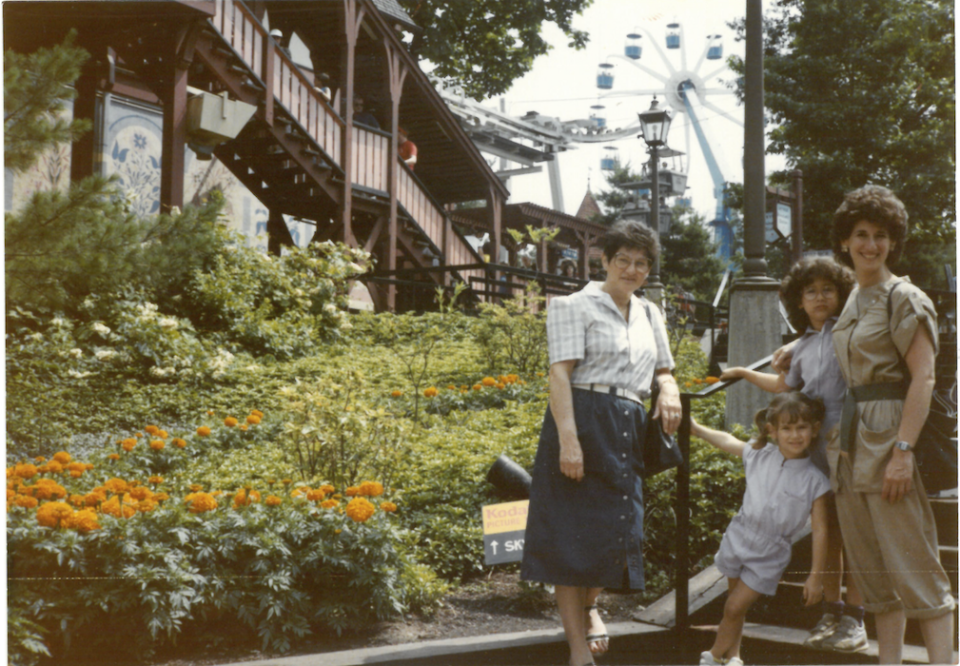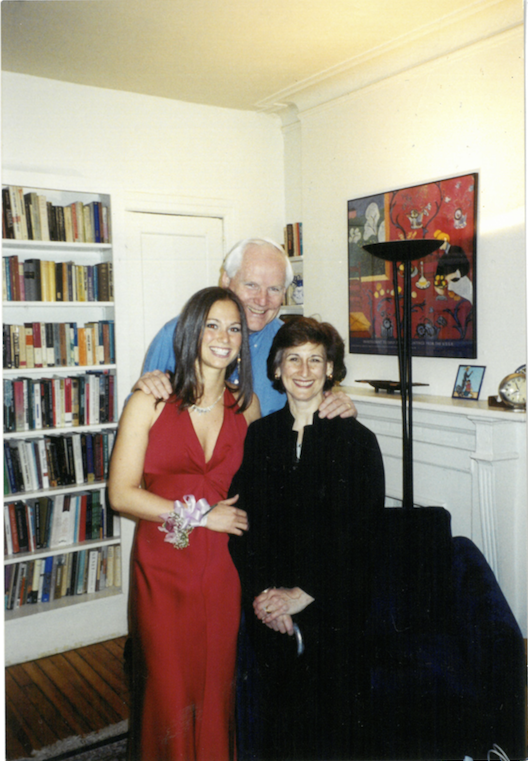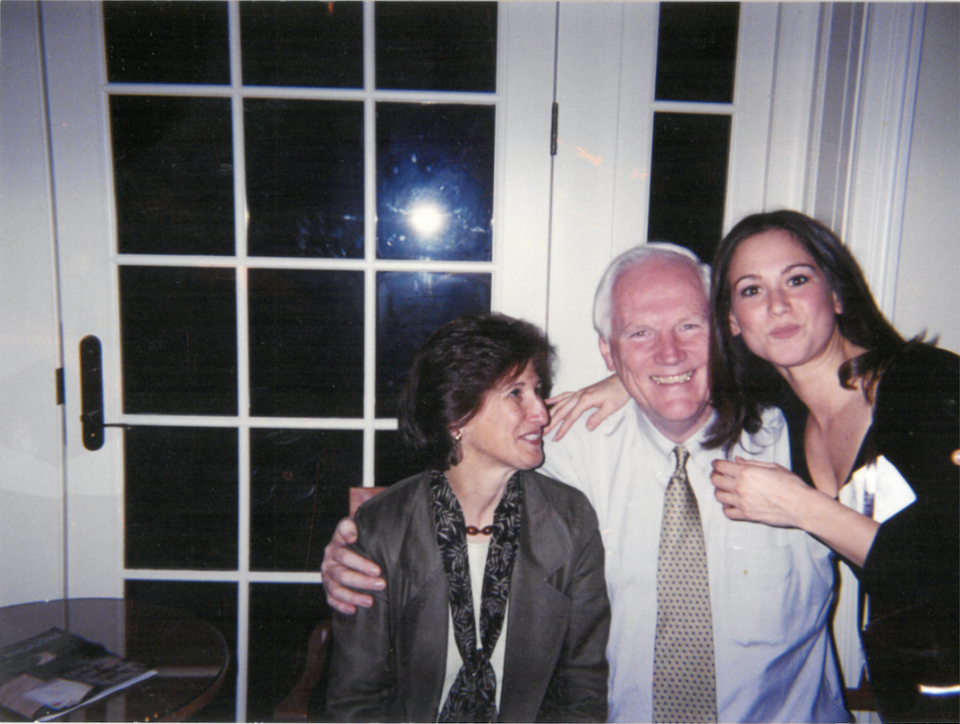I Spent Decades Living a Secret Life While Caring For My Sick Mom

I was in elementary school when my mom was diagnosed with multiple sclerosis. One day she sat me down in the living room at our home in Philadelphia and broke the news. She cried, which terrified me. I had no idea what the news meant for her or for me.
After her diagnosis, Mom's mobility declined quickly. At first, she struggled with her balance and walking long distances. By the time I was in middle school, she was using a cane, then riding in a scooter. A few years later, she used motorized wheelchair. When I would see her in a crowd of parents at school or at my dance school, I felt embarrassed. At that age, you don't want anything about your family to be different.

Mom and I had always had a good relationship, but when I went to college in New York (she and my stepdad had moved to Washington, D.C. by then), we got even closer. I flew home every few weeks, and she scheduled all of her doctor's appointments to fall during my visits. I've always been intensely loyal to her and defensive of what happens to her, so I'd ask the doctors a ton of questions. My step-dad, sister and stepsister are all very involved in Mom's care, too. But my relationship with my mom was so close that I would happily go home to spend time with her anyway. She was and still is my best friend.
"I had this secret life: Most days, I would sneak away from the office during my lunch break to help her."
By then, Mom needed help to do the normal stuff you and I take for granted, like preparing meals and taking a shower. I never really thought about how I was feeling when I helped her. I was just focused on the tasks at hand. It made me so sad to see her struggling physically. Thankfully, her mind remained sharp-she is the smartest, wittiest and most curious person I know.
After college, I moved back to Washington, D.C. and spent four years living at home and helping Mom. I didn't anticipate how exhausting and lonely those years would be. I had started my career in business, and I wanted to be really good at my job. But I also felt an intense sense of obligation to be there for mom. So I had this secret life: Most days, I would sneak away from the office during my lunch break to help her. I didn't realize it at the time, but our relationship had shifted away from the normal mother-daughter dynamic. I was the caretaker and she was reliant on me. I felt like I couldn't ask for the help I needed or be the vulnerable one. I had to be strong and upbeat for her.
My Secret Life
My friends knew my mom was sick, but they didn't realize the extent of my role. I didn't feel comfortable discussing the things I was going through with my mom over wine with my girlfriends. I didn't want to be a downer and was afraid that they'd look at me differently.

In 2006, I was offered a job in Los Angeles. I really struggled with the decision to take it. I wanted to advance my career, but moving felt like I was abandoning her and my duties as her daughter. When I told my mom I was moving and suggested getting an in-home aide to help her, she cried. She said, 'you'll never come visit me.' This completely broke my heart. I said, "No, I'll come visit often and we will get back to being mother-daughter again." We found a woman to help with her care and I moved to LA. For years living in LA, and then when I was in business school, I would hop on the first possible plane if I detected the smallest sign of trouble with mom's health or wellbeing. This resulted in lots of red eye flights, rearranged plans, and even missing my first year exams in business school.
After I moved, I carried around so much guilt. I felt an obligation to make something of my life and build a successful career, but I also felt so strongly that I should be taking care of my mom every day. I constantly felt torn and that I couldn't do both. In LA, I found a therapist who helped me understand that I needed to live my life and, ultimately, that's what my mom wanted for me too.
Even though I wasn't living at home, I was still helping with Mom's care in a lot of ways. In the last year, for example, I spent countless hours on the phone with the insurance company, talking to her doctors, and flying from New York to Chattanooga, where she had moved. For months at a time I flew home every weekend-and I still felt like I should be doing more.

A Company for Caregivers
The idea for a company that helps families like ours navigate their responsibilities had been in the back of my mind for a while. It came from a feeling that if we could hand off some of the research or have someone make some of the calls, then some of our burden would be lifted, and mom would get better care. I knew the problem, but I didn't fully have my head around the solution. In 2014, I quit my job in media/adtech to focus on finding it.
"There are more than 60 million unpaid family caregivers in the U.S."
That year, with my cofounder, Kevin Roche, I started a company called Wellthy. I quickly discovered that our family's experience wasn't unique-there are more than 60 million unpaid family caregivers in the U.S., many struggling to navigate the complex healthcare system while holding down a job and/or raising their own family.
The idea behind Wellthy is to match families caring for a sick or aging loved one with an expert care coordinator who will handle all of the logistical and administrative tasks and make it much easier on the family. They'll find the right in-home aides, contest and negotiate bills with insurance companies, call in prescription refills, coordinate doctor's appointments, and a lot more.
My Future With Mom
Now I use Wellthy to help with my mom. My care coordinator found Mom's current aide who she loves and who has played a huge role in keeping Mom alive during this past difficult year. Our coordinator handled a big billing issue for us and has even settled some disagreements between Mom and me about her care.
Since starting Wellthy, I finally feel like I'm doing enough for my career and for my mom. The feeling of guilt is gone. Now I feel a different obligation, to our clients, our team, and our investors.
Sometimes I think about all those long days and nights our family has spent caring for Mom. No one ever says to the family members, "you did great today." So we coach our care coordinators to acknowledge how much these families put in. They'll say, 'you're doing so much. Your mom is so lucky to have you.' Just having someone show compassion can release a flood of tears.
It has been so cathartic to share my story and to have my journey help other people. Everyday we get messages that say 'thank you; I don't know what I would do without you.' That makes this all worthwhile.
Lindsay Jurist-Rosner is cofounder and CEO of Wellthy.
Tell Us Your Caregiving Story
How has being a caregiver changed you? In an essay (500-word maximum), tell us below about the insight you've gained for the chance to win a free one-year subscription to Wellthy and have your story featured in an upcoming issue of Woman's Day.
You Might Also Like

